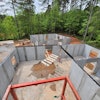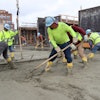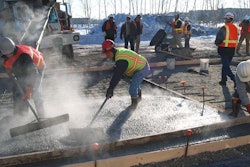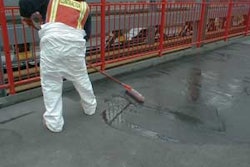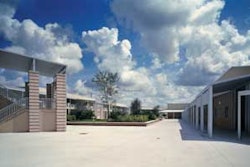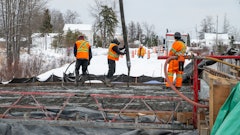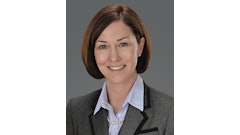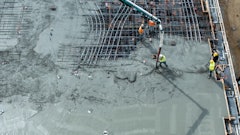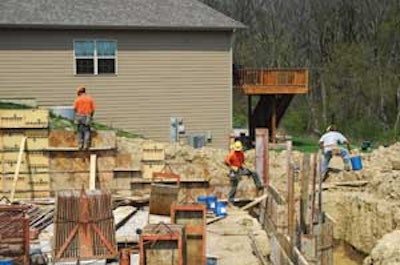
Greg Randa was like a lot of concrete contractors. He started out working for someone else for several years, then decided he wanted his piece of the pie and went out on his own. He started G.M. Randa Inc. in 1989 and built it into a successful operation.
And he was completely miserable.
"After about 15 years, I couldn't stand the thought of going to work," he says. "Something I had so much passion for in the beginning had just died. I realized all I'd done was spend 15 years building myself a job."
For Randa, the business had taken complete control of his life. He was working hard and usually making money, but never seemed to get ahead. He'd spend 12 to 14 hours a day in the field, then go back to his home office where he'd work into the night on estimates and other financial responsibilities.
"The business I had created provided a modest living for 15 years, but it took my life away," he says. "I was miserable and it just wasn't worth it."
As he looked back on his life at that point, Randa knew he had to make a change.
"All of the sudden my son is showing up at the jobsite asking for the keys to the truck, and it seemed like the last thing I remembered he was a year old and his mom was bringing him to the site to visit," he says. "Life is nothing but memories and I didn't have any. It's all moments and I missed quite a few of them with my family."
Sell out or make a change
In 2004, Randa was at a crossroads. He seriously entertained thoughts of selling the company and going to work for someone else. Continuing on in his business the same way was not an option, he says.
Up until this time, he thought he was alone — that all those other contractors out there had it all figured out. It was then that a few life-changing events happened.
First, he read The E-Myth Contractor by Michael Gerber. The premise of Gerber's book — the "E" stands for entrepreneur — is that most small business owners are really just technicians who had what he calls an "entrepreneurial seizure" and decided to start their own business. That is, they are technically skilled people, such as concrete finishers, who have the ability to do the work, but not the business training to run their company successfully. They spend so much time working on the day-to-day operations of the business, they never take the big picture view that is necessary to grow the company. Reading the book "kick-started" his transformation, Randa says.
"That was me down to a 'T,' " he says. "I had no control of what was going on around me because I was working on my knees all day."
Besides Randa being unhappy, the company was also in financial trouble. In 1999, the company had sales of more than $4 million and more than 30 employees — with losses of more than $160,000.
"After I got out of that debt, I realized I had worked so hard and had nothing to show for it," he says.
Randa knew the only way he could improve things was to focus on developing the business.
"I think the gut reaction when things aren't going well is to just keep working harder," he says. "I always thought, 'If we just pour this next foundation we'll be OK,' but that just got us past the crisis without addressing the bigger problem."
One important way he got help developing his business was joining the American Society of Concrete Contractors. He joined a MIX Group — a small group of noncompeting ASCC members from around the country — and began attending the annual spring and fall conferences.
"I really owe credit to the ASCC," he says. "Talking to the members of the group has really helped me build the business. Because of their experiences, they could tell me what not to do and I could learn from their mistakes."
By looking at the better run, better developed businesses owned by some of the ASCC members, Randa was able to quickly improve how he ran the company.
"Just feeding off of the information from those guys was so important," he says. "They're willing to share with anyone. All I can tell people is if you're in the industry, you should become a member of ASCC."
At the same time this was all going on, he made the decision to move his office out of his home.
"You have to separate your personal and professional life," he says. "Taking it home was a huge mistake because there was never that separation. The business was always there."
He also removed himself from the field operations and spent more time in the office to focus on building the business.
"It's so exciting now," he says. "We're putting systems in place, we're developing more business and I actually enjoy coming to work."
It's a long process, Randa says, but he can already see improvements in his business and personal life.
"I have time to think, which you can't do when you're in the field," he says. "Honestly, I probably wouldn't be in business today if I hadn't done this."
Adapting to change
Getting out of the field has changed the way Randa does business. Like many contractors, he feared what would happen when he wasn't there to directly supervise the work. He's kept control by implementing systems that allow him to stay updated from the office.
"It's been tough for me to let go, but now I'm 95 percent out of the field," he says. "I've learned to delegate and let other people handle the little things."
Every week, Randa meets with his superintendents to go over future and ongoing projects, but for the most part they are free to run the jobs and are accountable for the results. On a day-to-day basis, the foremen are responsible for entering all their important job data into a Palm Pilot which is synched right back to the office computers using Master Builder. At the end of day, Randa can see what got done on a project and keep an eye out for trouble areas.
Still, there has been some resistance to the changes. At first, some employees weren't sure what to make of the new way of doing business.
"I'd tell them, 'Here's what needs to get done today,' and the reaction would be, 'Well, what are you doing while we're out working?' Getting them to see it has been a challenge sometimes," he says.
The supervisors understand what's going on and are as excited as he is, Randa says. It's some of the other field employees who don't always see that he is trying to improve the company to everyone's benefit.
"For 15 years, I was working next to them in the field, so they're not used to me not being out there everyday," he says. "Part of me doesn't care because I am so satisfied with my life, but the other part of me really wants them to respect that I'm doing the right thing for the business."
Making the move has also required him to change his mindset.
"I realized the problem was myself," Randa says. "I don't have to be everywhere everyday; I don't have to be there to fix everyone's mistakes."
Learning from mistakes
Randa says there are many things he wish he had known before he went into business on his own. While he doesn't regret starting the business anymore, he does wish he hadn't waited so long to get help. He hopes that others just getting started in the industry can learn from what he's gone through and get involved in ASCC and other peer groups.
"I think the biggest thing I didn't realize was that you need to know more about the business than the craft," he says. "I spent too much time worrying about the work when I should have been developing systems to build the business. I can train guys to do the work."
Randa says he sees no reason the company won't continue to grow and be more profitable. Even with sales down from their peak of more than $4 million in the late 1990s, G.M. Randa is in better financial shape than it has been in years.
"As long as my field guys and I continue to be receptive to developing systems and efficiencies, there is no limit to what we can do," Randa says. "Being bigger is not the goal anymore. Being more efficient, more well-rounded and more receptive to our customers is what we have to focus on."
He now realizes that trying to get more work by focusing on low price is no way to build a business.
"A person is making a decision to buy our product," he says. "They can go anywhere to get that commodity, so we have to offer them service that sets us apart."
And now that the key employees are used to him being in the office and not in the field, he can be away and not have to worry that things are going to fall apart without him.
"I used to have to close the company to go on vacation," he says. "Now I do it and things are fine because I have good superintendents that don't need me watching them every step of the way."
Removing himself from the day-to-day field operations has also allowed him to begin developing an exit strategy, even though he's not planning on going anywhere soon.
"When I was in the field, I couldn't sell the business," he says. "All they were buying was my equipment and a few other assets. Now that I've developed these business systems, the company has a value beyond me and I have plenty of options."
Greg Randa is willing to talk to any contractor about his experiences. He can be reached at (630) 553-6412 or by e-mail at [email protected].
